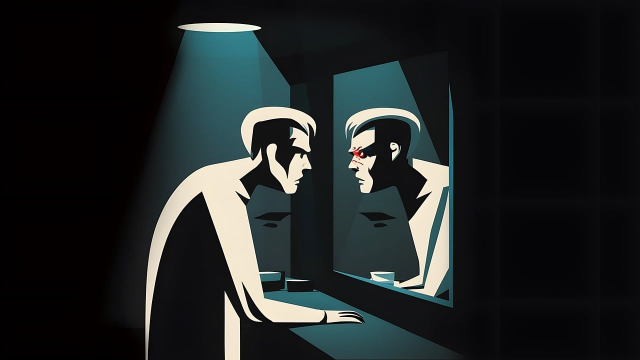Bipolar disorder is a mood disorder characterized by alternating episodes of mania and depression. It affects approximately 1-2% of the world's population and is a leading cause of disability in young people. Although its manifestations can be extreme and debilitating, it is a treatable condition with the right intervention.
Types of Bipolar Disorder
Bipolar disorder is classified into different types based on the severity and duration of manic and depressive episodes:
Bipolar I Disorder: Characterized by full-blown manic episodes that last at least a week or require hospitalization. In these episodes, the individual experiences abnormally elevated mood, irritability, or excessive energy. Major depressive episodes may also occur.
Bipolar II Disorder: In this type, manic episodes are less intense and are known as hypomania. These episodes usually do not seriously interfere with daily life, but depressive episodes can be debilitating. Many people with bipolar II disorder spend more time in the depressive phase than in the hypomanic phase.
Cyclothymic Disorder: Involves frequent and ongoing switching between hypomanic and depressive symptoms for at least two years, without meeting full criteria for a manic or depressive episode. Cyclothymia can be difficult to diagnose because the symptoms are often not as severe as those in bipolar I or II, but they can still significantly impact daily life.
Symptoms of Mania
During a manic episode, people experience an extreme increase in energy, creativity, and euphoria. However, this behavior is often accompanied by impulsivity and risky decisions, which can have harmful consequences. Common symptoms include:
Extreme euphoria or irritability: A person may feel invincible, full of energy, or experience excessive irritability, which can result in conflicts with those around them.
Increased activity or speech: Increased physical or mental activity may occur, leading to impulsive plans or talking rapidly, incessantly, and difficult to follow.
Decreased need for sleep: People in a manic episode often get very little sleep without feeling tired. They may sleep for only a few hours and still be full of energy.
Grandiose ideas: An exaggerated sense of power, importance, or abilities. This can lead to risky behaviors, such as spending large amounts of money, starting unplanned ventures, or engaging in dangerous activities.
Symptoms of Depression
In contrast, depressive episodes involve deep sadness, hopelessness, and fatigue. During these periods, people may feel like they have no energy or motivation to do everyday activities. Symptoms include:
Deep sadness or emptiness: The person may feel hopeless or worthless, which can lead to thoughts of suicide or self-harm.
Loss of interest in activities: Things they once enjoyed may no longer have meaning. This symptom is known as anhedonia and is characteristic of depressive disorders.
Fatigue or lack of energy: It may be difficult to get out of bed, move around, or simply perform basic daily tasks.
Difficulty concentrating or making decisions: People in a depressed state may find it difficult to think clearly, which can affect work, school, or personal life.
Changes in appetite or weight: This may manifest itself in loss of appetite or, conversely, overeating as a way of managing emotions.
Causes of Bipolar Disorder
Despite advances in research, the exact causes of bipolar disorder are not fully known. However, it is thought to be the result of a combination of genetic, neurobiological, and environmental factors:
Genetics: Bipolar disorder tends to run in families. Studies have shown that first-degree relatives of a person with bipolar disorder are at significantly higher risk of developing the illness. However, genetics are not the only factor, suggesting that other factors may be involved.
Brain chemistry: Neurotransmitters, which are the brain's chemical messengers, play a crucial role in regulating mood. Imbalances in neurotransmitters such as dopamine, serotonin, and norepinephrine have been associated with bipolar disorder.
Environmental and psychological factors: Stressful events, trauma, or major life changes, such as the loss of a loved one or substance abuse, can trigger manic or depressive episodes in genetically predisposed people.
Diagnosis and Treatment
Diagnosis of bipolar disorder is often complicated by symptom overlap with other mental health conditions, such as major depression, anxiety disorder, or borderline personality disorder. To properly diagnose the disorder, doctors usually conduct a detailed evaluation that includes a clinical interview, a complete medical history, and, in some cases, laboratory tests to rule out other medical conditions.
Drug Treatment
Treatment for bipolar disorder typically includes a combination of medications and psychological therapy. Commonly used medications include:
Mood stabilizers: Lithium is one of the best-known mood stabilizers and has been shown to be effective in preventing both manic and depressive episodes. Other medications include valproic acid and carbamazepine.
Antipsychotics: Antipsychotics are sometimes used to control manic episodes, especially when symptoms of psychosis, such as hallucinations or delusions, are present.
Antidepressants: Although antipsychotics are used to treat depressive episodes, they should be used with caution because they can trigger manic episodes if not combined with a mood stabilizer.
Psychological Therapy
Psychotherapy, or talk therapy, is an essential part of treatment for bipolar disorder. Some effective approaches include:
Cognitive behavioral therapy (CBT): Helps patients identify distorted thinking patterns that may be contributing to their symptoms and develop strategies to manage them.
Psychoeducation: Involves educating patients and their families about the disorder, its symptoms, and ways to recognize early signs of manic or depressive episodes.
Interpersonal and social rhythms therapy (ISRT): This therapy focuses on improving interpersonal relationships and stabilizing daily rhythms, such as sleep and meals, that can influence mood episodes.
Bipolar disorder is a chronic condition that requires long-term management. However, with proper treatment, many people can lead productive and fulfilling lives. Support from family and friends is crucial, as is regular follow-up with a medical team. People with bipolar disorder should be alert to potential triggers, such as stress and lack of sleep, and work with their doctor to adjust treatment as needed.
